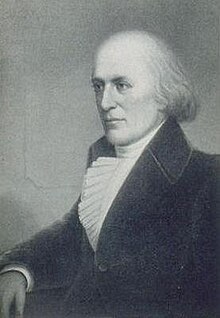Francis Dana
| Francis Dana | |
|---|---|
 |
|
| United States Ambassador to Russia | |
|
In office December 19, 1780 – September 1783 |
|
| Succeeded by | William Short |
| Associate Justice of the Massachusetts Supreme Judicial Court | |
|
In office 1785–1791 |
|
| Preceded by | Jedediah Foster |
| Succeeded by | Thomas Dawes |
| Chief Justice of the Massachusetts Supreme Judicial Court | |
|
In office 1791–1806 |
|
| Preceded by | Nathaniel Peaslee Sargent |
| Succeeded by | Theophilus Parsons |
| Personal details | |
| Born |
June 13, 1743 Charlestown, Massachusetts |
| Died | April 25, 1811 (aged 67) Cambridge, Massachusetts |
| Resting place | Old Burying Ground, Cambridge |
| Nationality | American |
| Residence | United States |
| Alma mater | Harvard University; |
Francis Dana (June 13, 1743 – April 25, 1811) was an American lawyer, jurist, and statesman from Massachusetts. He served as a delegate to the Continental Congress in 1777–1778 and 1784. He signed the Articles of Confederation. His wife Elizabeth was a daughter of Ann Remington and William Ellery, a signer of the Declaration of Independence. He was also the father-in-law of Washington Allston, a noted painter and poet.
Francis was born in Charlestown, Massachusetts, the son of lawyer Richard Dana. He was educated at Harvard where he graduated in 1762, then read law and was admitted to the bar, after which he built a successful legal practice in Boston.
Being an opponent of the British colonial policy, he became a leader of the Sons of Liberty, and was first elected to Massachusetts’s provincial (revolutionary) Congress in 1774. In 1775 the Continental Congress dispatched him to England in an unsuccessful attempt to reconcile the differences leading to the Revolutionary War. He returned the following year, convinced that a friendly settlement of the dispute was impossible, and was elected a delegate to the Continental Congress in 1777, where he signed the Articles of Confederation in 1778. As a member of the latter body, he became chairman in January 1778 of the committee appointed to visit Gen. George Washington at Valley Forge and confer with him concerning the reorganization of the army. This committee spent about three months in camp, and assisted Washington in preparing the plan of reorganization which Congress in the main adopted. In this year, he was also a member of a committee to consider Lord North's offer of conciliation, which he vigorously opposed.
...
Wikipedia
